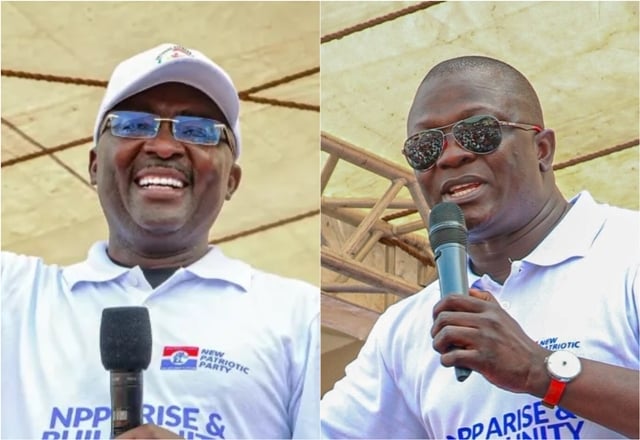Dr. Mahamudu Bawumia, the former Vice President of Ghana, delivered a potent message of unity and introspection to his party, the New Patriotic Party (NPP), during their 33rd-anniversary celebration in New York. In the wake of their 2024 electoral defeat, Dr. Bawumia addressed the concerning rise of tribal narratives within the party, urging members to abandon such divisive tactics and focus on healing and rebuilding for future success. He emphasized the detrimental impact of these narratives, labeling them a grave threat to the NPP’s unity and overall survival. Specifically, he condemned attempts to discredit his own candidacy based on his ethnic background, dismissing such arguments as baseless propaganda that only serves to fracture the party. He reassured the audience that these sentiments do not represent the majority of NPP members and affirmed the party’s historical commitment to overcoming tribal and religious bigotry. His central appeal was for unity as the essential ingredient for a triumphant return to power in the 2028 elections.
Dr. Bawumia underscored the NPP’s foundational principle of inclusivity, tracing its roots back to the United Party (UP). He highlighted the UP’s diverse origins, encompassing groups from various regions, religions, and communities, including the Northern People’s Party, the Muslim Association Party, the Ga Shifimokpee, and the Anlo Youth Organisation. This historical perspective served to remind the party of its strength derived from embracing diversity, a principle he urged them to revitalize in the present moment. He argued that unity born from diverse backgrounds has always been the lifeblood and foundation of the NPP, and now, more than ever, it is crucial to reaffirm and strengthen these unifying bonds.
The former Vice President further emphasized his longstanding commitment to the NPP, recounting his contributions to the party’s successes, including his legal defense of the party, his extensive nationwide campaigning, and his leadership in initiatives that contributed to their electoral victories in 2016 and 2020. He pointed out that during those campaigns, his ethnic and religious background were never points of contention. This observation served as a powerful rhetorical question: “When I was campaigning the length and breadth of Ghana, nobody said I was a northerner, a Mamprusi or a Muslim. So what has changed now?” This question challenged the recent emergence of tribal narratives and underscored their incongruence with the party’s past acceptance and celebration of his diverse background.
Dr. Bawumia’s call for maturity within the party was a plea to move beyond the bitterness of defeat and prioritize the collective good. He cautioned against the dangers of allowing such divisive rhetoric to define the NPP, emphasizing that such narratives risk falsely portraying the party as tribal and sectional, contrary to its true nature. He reiterated the party’s historical identity as a unifying force, embracing all regardless of background. The message was clear: the NPP must avoid repeating the mistakes of internal division that led to their setback in 1979. He concluded with a powerful statement of confidence, asserting that a unified and healed NPP would be an unstoppable force in the 2028 elections.
In essence, Dr. Bawumia’s address served as a critical intervention in the post-election soul-searching within the NPP. His message centered on the imperative of unity, reminding the party of its inclusive roots and warning against the destructive potential of tribal narratives. He challenged the notion that his ethnic or religious background should be a disqualifying factor for leadership, drawing on his past contributions to the party as evidence of his dedication and effectiveness. His speech was a call for maturity, urging the party to transcend bitterness and focus on healing the rifts created by the election. He forcefully rejected attempts to pigeonhole the NPP as a tribal or sectional party, reaffirming its historical commitment to unity and inclusivity as the bedrock of its identity and future success.
This emphasis on unity served not only as a critique of current divisive trends within the party but also as a roadmap for the future. He framed unity as the key to healing from the 2024 defeat and positioned it as the essential ingredient for victory in 2028. By linking the party’s past successes to its inclusive nature and contrasting this with the current emergence of tribal narratives, he presented a compelling case for a return to the NPP’s core values. His message was a call for introspection, a plea for healing, and a rallying cry for unity as the path forward for a stronger and more successful NPP in the future. He argued that only by embracing its diverse heritage and rejecting divisive rhetoric could the NPP hope to regain its footing and achieve its political goals. His speech served as a powerful reminder that a house divided cannot stand, and that only through unity and a shared vision can the NPP hope to achieve future success.














